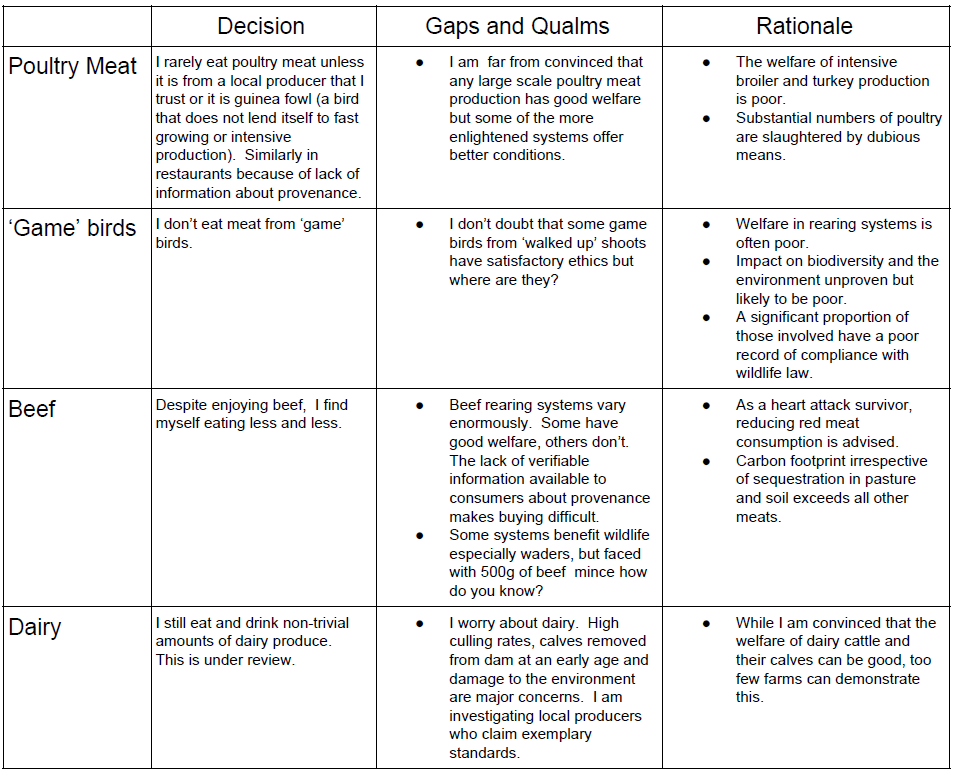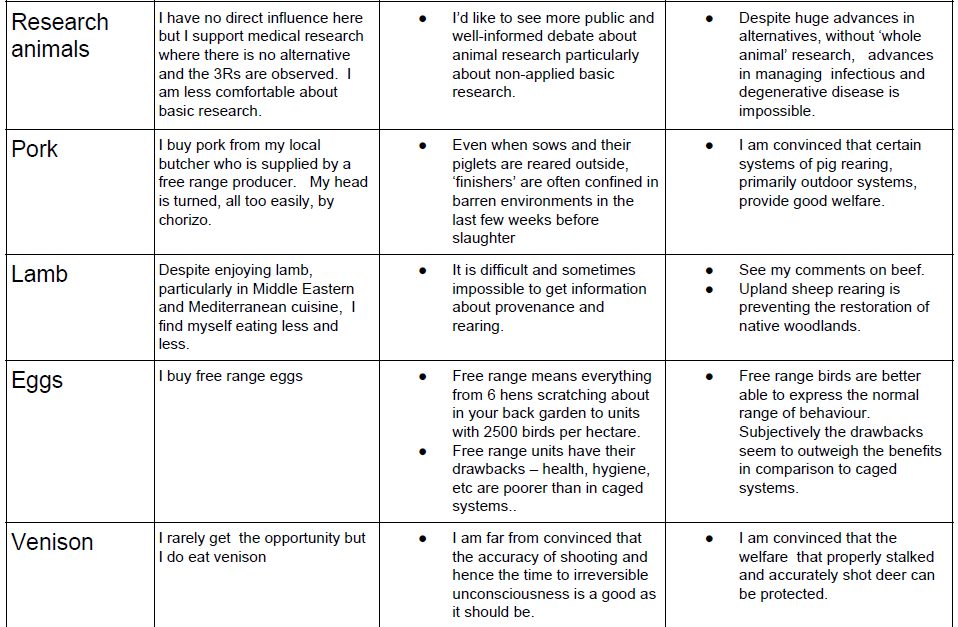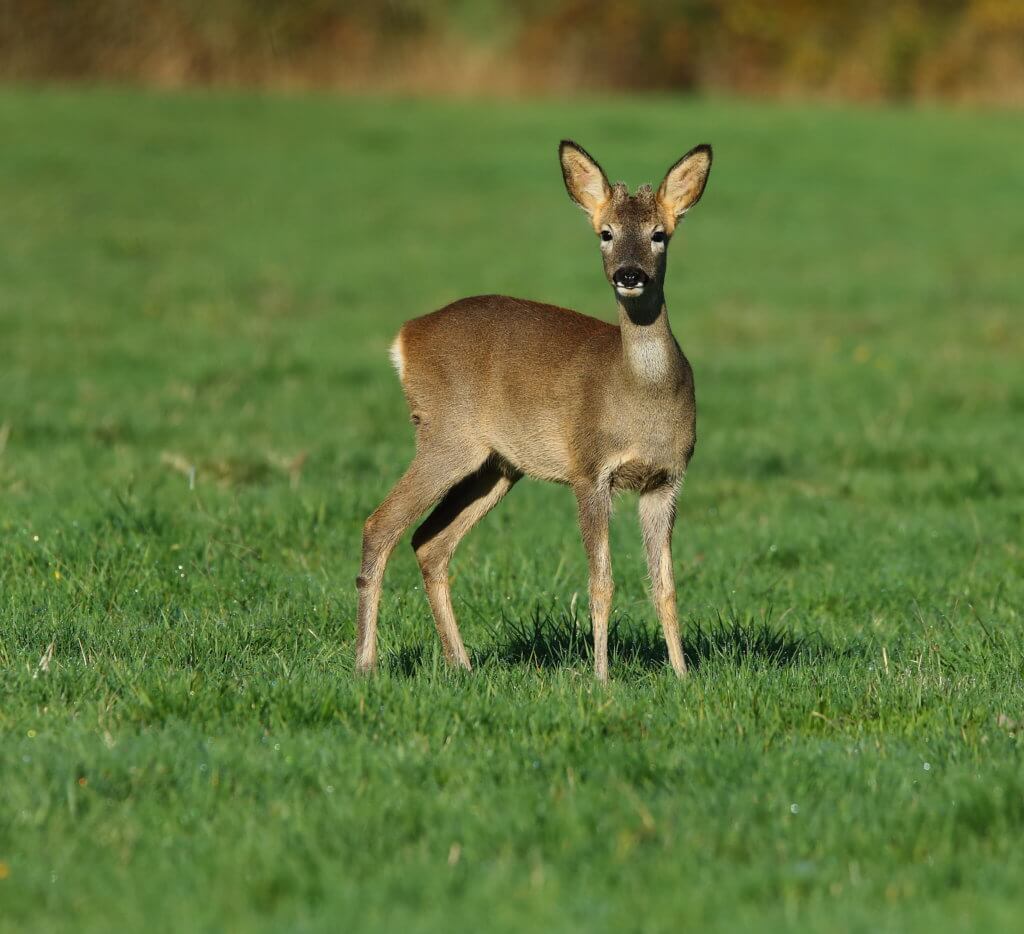
Alick Simmons is a veterinarian, naturalist and photographer. After a period in private practice, he followed a 35-year career as a Government veterinarian, latterly as the UK Government’s Deputy Chief Veterinary Officer. Alick’s lifelong passion is wildlife; he volunteers for the RSPB and NE in Somerset, is chair of the Universities Federation for Animal Welfare, a member of the Wild Animal Welfare Committee and a trustee of Dorset Wildlife Trust. A particular interest of his is the ethics of wildlife management and welfare. He is pictured above on the People’s Walk for Wildlife in September 2018.
This post is the last in a series intended to get people thinking about animals and their exploitation. (Part 1, Part 2, Part 3).
Thus far, I haven’t advocated any particular position although it is inevitable some of my views have come to the surface in the course of the first 3 parts. I am not vegan or vegetarian although I have often thought about becoming one or the other. During the course of a career as a veterinarian, I have had the benefit of being able to ‘lift the lid’ on all manner of animal exploitation both in the UK and overseas. I haven’t always liked what I’ve seen but neither was it universally awful. In fact, there is much to commend. Some, but only some, questionable practice is worth tolerating given the benefits to humankind.
Assuming you’ve assimilated parts 1-3 you might reasonably ask ‘what’s the next step?’ Earlier in the series, I proposed a personal ethical framework. I suggest you consider your position, species by species and system by system. You might conclude that none is acceptable. On the other hand, you might choose to accept the exploitation of some species in some circumstances but not in others. My only plea is that you seek out and use the best information to make choices and not be swayed by siren voices.
Much of this series has been about animal welfare and the ethical choices we make. However, our choices can and should be about more than just animal welfare. There are three additional factors I advocate taking into account; they are health, environment and biodiversity. I am expert in none but for what it’s worth, here’s my take:
Health: Evidence is mounting that eating large amounts of meat and dairy products is not good for your health. This applies particularly to fresh meat containing large amounts of saturated fats and to meat products such as bacon where nitrites are used as a preservative. Red meat is particularly singled out.
Environment: Livestock farming is a net contributor to greenhouse gas emissions and we are being encouraged to eat less meat as part of managing climate change. However, some meats have a smaller carbon footprint than others. Beef is particularly high while poultry meat is relatively low. In essence, the larger the animal and the longer it takes to mature, the more greenhouse gas per kilo. And monogastrics (poultry and pigs) because of their digestive system produce less than ruminants (cattle and sheep). It is argued that some of the carbon footprint from lamb and beef produced from permanent grassland can be offset against the carbon sequestered in the soil and pasture. However, in comparison to woodland which some argue should be used to replace pasture land, this is trivial.
Biodiversity is not something you would normally associate with a discourse about animal exploitation and meat eating. But well managed grazing is good for bird life. For example, without grazing, particularly in the lowlands, four species of breeding waders, snipe, curlew, redshank and lapwing, the populations of which are in free fall, would almost certainly disappear. One might argue grazing might be better done by native ruminants such as roe and red deer but there is nothing like a cow for removing large amounts of grass and other vegetation. And, because they allow for the free expression of most normal behaviour, extensive grazing systems are amongst the best for animal welfare. I should make it clear that I do not hold the same sentiments for sheep, at least those grazing the uplands. There are many reasons why much of upland Britain is free of native woodland. Most of them are sheep.
It soon becomes clear that there is a conflict between these factors. Those systems that are amongst the best for welfare (extensive cattle and sheep production) and, in some cases supporting high biodiversity, have the worst carbon footprint while pig and poultry production, at least those with any commercial prospect, because of their intensive nature and rapid growth, have the worst welfare and the lowest carbon footprint. I told you it was complicated.
There is no easy answer to this. I’ve thought about this and haven’t reached a conclusion. Of course, it would be simpler to become vegan and have done with it but the initial choice appears simplistic (although I am under no illusion about how difficult it is to do properly). Perhaps part of the reason why I haven’t become vegan is that a feels like a repudiation of my life to date and my whole career. I happen to enjoy many types of meat but that shouldn’t be the sole reason to carry on if the evidence against meat consumption continues to pile up. Conversely, if there is sufficient, robust information about good livestock production systems, etc where the evidence of good welfare is clear, then why not?
Other than complete abstinence, the only conclusion is to eat less and better meat from sources you can trust. Obtaining information that engenders that trust is difficult but for meat you cook at home it is not impossible. Ask and if you are aren’t happy with the answer, err on the side of caution. But meat for the home is only a small part of it. It gets very much more difficult in a restaurant: Have you ever asked about the way the chicken on the menu was reared? And been content with the answer? No, nor have I.
What about animal products such as leather? Try asking the salesperson about the provenance of your leather shoes when you are next trying them on. Let me know how far you get. I was once in a posh mall in the USA and idly asked the salesperson in a shop selling shaving gear about the provenance and welfare of the badgers that had supplied the bristles for the brushes. ‘Oh’, she gushed, ‘You needn’t worry about that. They’re not American badgers’. I now have a beard.
To illustrate my current position, I’ve produced this table. It’s a work in progress.


I emphasise this is my personal position: It’s not a blueprint but it might be useful as a template. I don’t claim perfection: There is science behind it but it is also driven by personal choice and my own ethical code.
There are two points that I have yet to cover and because neither seem to fit into the table, I will deal with these separately. The first one is pets. Should one keep a dog or a cat? Both are carnivores and cats tend to catch, kill and eat all manner of small wildlife. However, if you are resolutely vegan then you may be able to get away with making your dog vegan too. But not your cat. Dogs are not obligate carnivores and can survive well on a non-meat diet of the right composition. On the other hand, cats are obligate carnivores will not thrive without animal protein. It’s that simple.
I’ve received stick for admitting to keeping cats because of the belief that cats are to blame for much of the decline in British wildlife. The jury is still out and I await the results of a scientific survey in which I and my cats participated (https://wildlifescience.org/portfolio/domestic-cats/). If it proves that cats do have a significant impact on native wildlife, then I will take appropriate action. As I am neither a hunt servant nor a greyhound trainer, I will not treat them as an inconvenience and shoot them in the head but rather I will restrict their activities as they grow older and eventually die.
The second one is fish including angling, commercial fishing and aquaculture. I’ve fished since my early teens but never very well. As evidence of the detrimental effects of fishing with hooks combined with knowledge of fish sentience and the ability to feel pain builds up, I have increasing qualms about it. But I love to sea fish and, at present, if the few fish I catch are dispatched quickly and eaten then I can live with it. Commercial sea fishing, however, often involves suffocation of thousands of fish at a time often after having been dragged up from the depths which, in itself, because of the changes in pressure, must cause suffering. Work is underway to better understand this and to mitigate the effects of net fishing on welfare. Should we stopping catching and eating fish? I don’t know, but I am keeping it under review. I have similar qualms about aquaculture or fish farming: poor welfare, difficulties in controlling disease and the environmental impacts all detract from what was a promising industry. I find my consumption of farmed salmon, for example, dwindling fast.
~~~~~~~~~~~

It is inevitable that, if you change your diet, you will become the subject of interest to your friends and perhaps you’ll feel the need to explain. Here’s a few tips:
Don’t flagellate yourself: By all means, stick to your beliefs but don’t be a martyr. I choose not to eat pheasant, grouse or partridge (see table above) but I am not going to scourge myself if I find the paté I ate at that party contained pheasant. Be aware, try your best but be practical.
Despite that I encourage you to err on the side of caution: For example, if you are buying ready meals or in a restaurant and there is no information about the provenance of the meat, I’d avoid it. Or, better still, ask.
Don’t evangelise. Especially at social events. By all means explain but don’t think you have to convert the world. No one wants a sermon at a party. Alternatively, try blogging.
Keep it under review. Be prepared to change your mind when new facts or better information emerges. I say better information because you might want to reverse a decision not to eat, say, pork, when a local producer starts to sell pork from a system that you are comfortable with. Or stop wearing leather shoes when someone produces all synthetic shoes which don’t look like something your 5 year old would wear.
Try to consider things holistically. Decisions like this are rarely black and white. For example, eschewing beef might help reduce greenhouse gas emissions and might be better for your health but this has to be set against the value of some grazing animals that enhance biodiversity. It might be better to eat smaller amounts of better beef less frequently and from a producer you trust.
~~~~~~~~~~~
That’s it. It’s certainly not the last word and it’s not the only word. On the face of it things are changing. Interest in veganism is increasing with more people than ever claiming to have adopted a vegan diet. However, meat consumption in the UK is not falling and consumption of poultry meat is steadily increasing. With poultry having amongst the worst welfare of any farmed animal that is not good news. It’s enough to turn you off meat altogether. But if, like me, you believe humankind benefits from well-regulated and sympathetic animal exploitation, then it’s not a binary choice. I want people to take intelligent, evidence-based decisions. Making sense about animal welfare, animal rights and animal exploitation is difficult particularly as much of the available information it is contradictory, polemical and bordering on a rant. It isn’t helped by companies falling over themselves trying to establish their green and animal welfare credentials. A lot of it is greenwash but there are companies that genuinely care. Sorting the wheat from the chaff is difficult.
Don’t give up. Read about it, question and think about it. You don’t have to change your habits much or at all. It’s your choice. You might yet become vegan. So might I.
The objective was to get you thinking and if I have succeeded, then all to the good. Judging by some (but no means all) of the thoughtful comments stimulated by the first three posts, I have achieved that with some people. For now, mission accomplished.
[registration_form]
I’ve really enjoyed all of these pieces. They help highlight two issues that I’ve struggled with over the years. Firstly, it’s impossible to get to a definitive answer on the degree of animal cruelty that is acceptable in order to provide benefits for humans. You could make a logical case that any amount of cruelty is acceptable because we are just one species of many, evolved to be selfish in order to maximise our own wellbeing. No other species gives a second thought about its impacts on other creatures. Animal suffering is as routine in the natural world as it is in the farming of domestic livestock. Protect an area of natural habitat and you are ensuring the continuation of huge amounts of animal suffering. In the end you are left with a gut feeling about what is ok and what isn’t. For most (but not all) people swatting a wasp is fine but for some, the very worst excesses of cruelty don’t feel problematic. It’s hard to make a case that those people are somehow ‘wrong’ or immoral, and they would have been the overwhelming majority just a few hundred years ago.
I tried (largely unsuccessfully) to raise a related issue in a blog about eating Minke Whales a couple of years back: (https://markavery.info/2017/12/19/wild-food-20-minke-whale-ian-carter/). The gut feeling for most people suggests that this is ‘wrong’ but if you pause to consider it logically then it’s not so clear cut. I’d be interested to see where this species would fit in your table.
The second issue is that of significant personal sacrifice for almost no gain. I’d find it very hard to give up meat. It would be a big personal loss and yet it would make next to no difference to animal welfare on a global scale. Again, when we have evolved to be selfish, that is a difficult barrier to overcome. It’s much the same with climate change. We all moan about Trump and many welcome the ER protests,yet most of us carry on quite happily burning far more than our fair share of carbon, sometimes constructing elaborate justifications, sometimes not bothering even to do that. I was on the motorway when I first heard about Trump pulling out of the Paris agreement, shaking my head like all the rest of us. The irony only struck me later.
I aspire to do better when it comes to animal welfare, and your blogs have been very helpful. But it’s hard isn’t it.
I agree with the post but would add another paragraph about not wasting food. If you’ve killed an animal to eat it then at least eat all of it.
A good point, thank you. I’ll include it in the next edition.
Thank you. I particularly like your comment ‘No other species gives a second thought about its impacts on other creatures.’ That is not a universal view but it is becoming more widely accepted as science demonstrates greater sentience in a greater number of animals and as the influence of religion wanes.
I am heavily influenced by the philosopher John Gray whose 1992 book, Straw Dogs, includes this: ‘The mass of mankind is ruled not by its intermittent moral sensations, still less by self-interest, but by the needs of the moment.’ Despite that, our consciousness, sentience and ability to look forward is far more advanced than any other animal. That includes empathy. If we can’t apply that ability to animals why bother apply it to our fellow humans?
I very much enjoy reading your entries. They are thought-provoking and also make me feel a little bit better about my own dietary choices (just a little).
However, I do have a couple of questions regarding this entry…Vegetarian/vegan diets. You seem to think, like many nowadays, that this would be a cure for all, solving all our issues. Let’s just get rid of all the farmed animals and plant veggies instead. But, what about soil degradation? If you have to supply vegetables for all humanity, you will need to plant a lot of stuff. Vegetables as not as nutritious and filling so people will eat more of them. I notice how much vegetables I need to eat on my ‘detox’ days to stay full-ish.
Another aspect it biodiversity – do you really think that crops provide better habitat for wildlife than pasture? You have to flatten everything out, take out all the other plants/trees (minus small borders between fields) and keep it barren (nothing grows apart from the crop). How good would that be?
And then there is pest control. While on animal farms wildlife is accepted, when a farmer grows crops it’s not so. Everything that eats your crop must disappear – from rabbits, through birds to deer. Are vegans/vegetarians really aware of how many animals are slaughtered for their food? At least when you eat meat, you can use squirrels, rabbits, deer etc., if you don’t, they end up disposed of, meat wasted.
Surely vegan/vegetarian diets are not as great as people are led to believe by the social groups who pretty much terrorise meat-eaters on a daily basis nowadays. Wouldn’t it be better for us to eat both plant and animal products but do it in a responsible way – cook, source products yourself and eat as much as you need so you don’t waste food. We are omnivores in the end, let’s stick to what’s natural to us but do it in a more intelligent way.
Another point that raised my eyebrows was your comment on dogs and cats. Yes, cats can die if their owner is stupid enough to put them on a vegetarian/vegan diet. Some will argue supplements will help with that. Dogs will ‘survive’ on plant-based diets but if you put a bowl of that down and a bowl of meat down…they will make a choice that won’t make any vegans happy. What right do we have to decide what our pets eat? I feed my pets (cats and dogs) raw, biologically appropriate diets – that’s meat. You wouldn’t want to feed anything else once you see the sparkle in their eyes when you take out a meaty bone for them to enjoy. Yes, they enjoy it! Immensely. If a vegan/vegetarian can’t stand the thought of feeding their pet what they should be eating, they can get a companion with a similar view on diet – rabbits, horses, etc. Leave dogs and cats to others or clench your teeth and give them meat. We have no right to force our beliefs and choices on our pets. They deserve diets they love and enjoy rather than something they ‘survive’ on.
You say you accept some animal exploitation, just like I do, though I do not accept animal testing for human health benefit – not that I can actually do much about it. I think if something is to benefit humans, humans should be the ones paying for it. Might be extreme, but testing cannot be put in the same bag as food. But it’s my opinion, and I hope we won’t need to test on animals for much longer with the advancements in the pharmaceutical industry.
Good luck with your cat research by the way – personally I recommend keeping them safe in your garden (hunting aside, at least there is no risk of them getting hit by a car or hurt by humans).
Thank you for commenting. I fear I must correct you on two points.
I neither advocate a vegan (or a vegetarian) diet nor advocate the elimination of grazing animals.
Sorry! Not entirely what I meant to say – what I wanted to say that those who choose vegan/vegetarian diet want to see the end of grazing animals and promote their diets as the best way to save the world. I feel that’s just misleading and incorrect. What I wanted to ask was whether you think that all humanity swapping to vegan/vegetarian diets would be a good idea? From my own research, I can’t say how accurate, but it doesn’t look like all rainbows and unicorns…
I don’t feel qualified to comment particularly if you wanted a view about the health benefits of a vegan diet. But it’s hard to ignore advice from two different positions (public health and climate change mitigation) both of which say reduce meat consumption.
Congratulations. One man’s reasoned opinion eloquently put. Don’t agree with it all but there is one that I really do support: ‘Don’t evangelise’. Virtue signalling is the worst of modern society. I was in a restaurant recently and asked what was in a dish to which the waiter replied: ‘How would I know, I am a vegan.’ Cue no tip! Pompous ass.
I do eat game but as a falconer it is always lead-free and clean killed. Clean shot venison is also to be recommended.
I wonder if there is an opportunity for a series on the ‘exploitation of plants’? Strictly tongue-in-cheek? After all if Prince Charles talks to them they must be sentient.
Nick – go ahead and write it!
Thank you. The story about the waiter is priceless.
I look forward to commenting on the plant article.
I have a nice book “Fifty Plants that Changed the Course of History” by Bill Laws. Beautifully illustrated and littered with anecdotes. I must read it sometime, from Agave to Zingiber.
On my meat free days, I sometimes allow myself a tub of beef dripping.
It is the by product of a previous days meal, so is acceptable,to me anyway.
I don’t feel able to respond to that. Not sensibly.